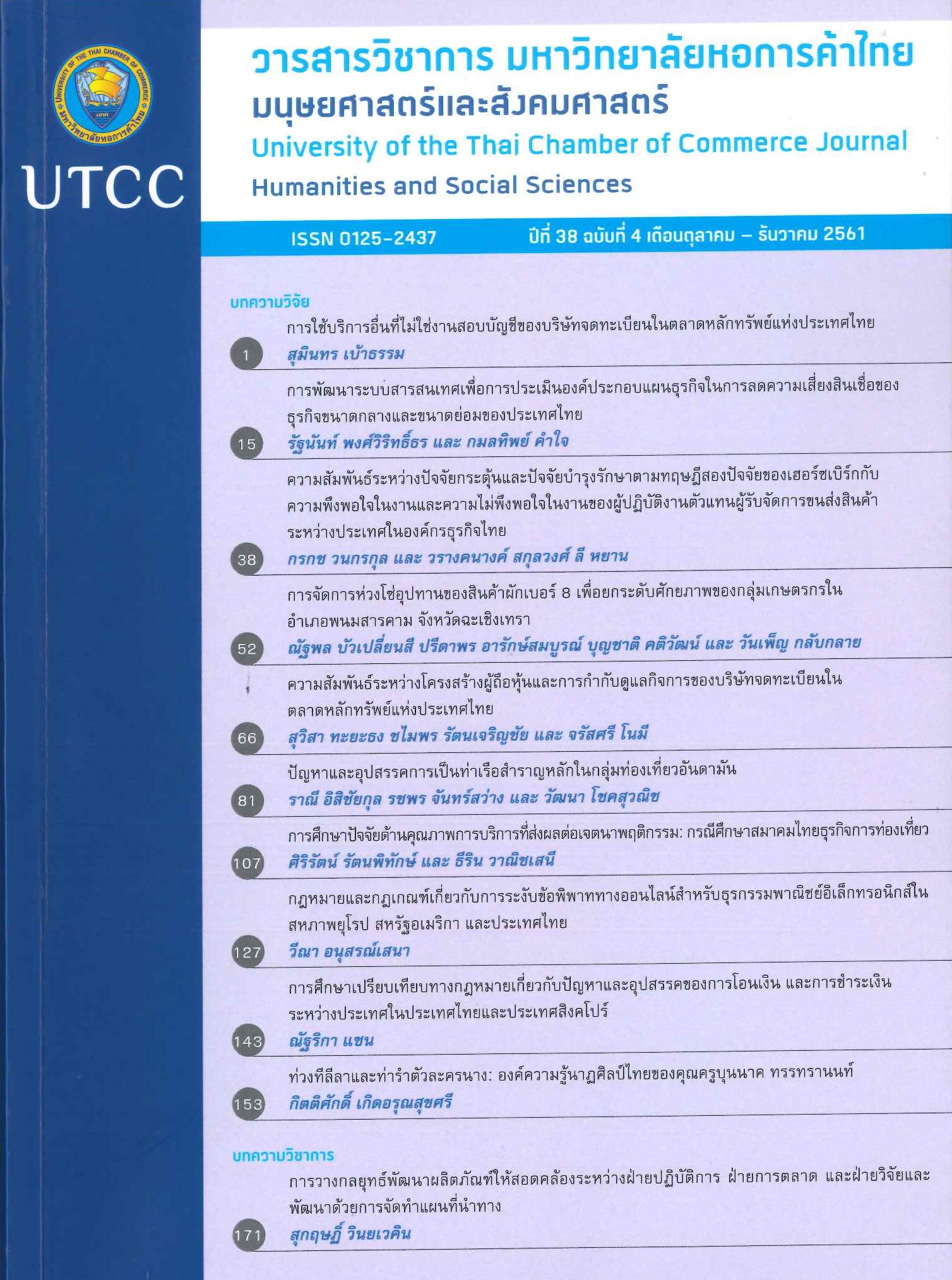Development of Information System for Components Assessment of Business Plan in Credit Risk Mitigation of SMEs in Thailand
Main Article Content
Abstract
This research aims to study the development of information systems for components assessment of the business plan in credit risk mitigation of SMEs in Thailand. The population and sample consist of 200 SMEs entrepreneurs who are the members of Small and Medium Enterprise Development Bank of Thailand. The sample was selected using the nonprobability sampling method and randomly selected the sample using purposive sampling method as the business data was important and required volunteers to participate in the project. Data was collected using the questionnaire that evaluated by the expert advisors. The research result showed the component of the business plan was at the medium level (average 3.10, S.D. = 0.54), in each aspect showed that in terms of production (average 3.30, S.D. = 0.47) and in terms of management (average 3.32, S.D. = 0.50) were at the high level, while in terms of finance (average 2.91, S.D. = 0.52) and in terms of marketing (average 2.89, S.D. = 0.65) were at the medium level. By the way, the average cut-off point of the business plan is 714 points, if the cut-off point is set at 750 points, then the entrepreneurs’ credit for the business plan would be rejected. The guidelines for the development of the information systems for component assessment of business plan in credit risk mitigation of SMEs in Thailand should focus as follows: 1) The access to financial resources of SMEs entrepreneurs should be provided in the form of components of the business plan and businessmanagement. 2) Application of innovation and technology to optimize the business capability. 3) Providing the knowledge of business risk management and risk mitigation in order to access the low-cost capital from the financial institutions. 4) Monitoring, evaluating, and using the information to develop the information systems to meet the criteria of the user requirements to find the solutions to the problems that will make the SMEs business become sustainable in the
future.
Article Details
ลิขสิทธิ์ของบทความ
ผลงานที่ได้รับการตีพิมพ์ถือเป็นลิขสิทธิ์ของมหาวิทยาลัยหอการค้าไทย ห้ามมิให้นำเนื้อหา ทัศนะ หรือข้อคิดเห็นใด ๆ ของผลงานไปทำซ้ำ ดัดแปลง หรือเผยแพร่ ไม่ว่าทั้งหมดหรือบางส่วนโดยไม่ได้รับอนุญาตเป็นลายลักษณ์อักษรจากมหาวิทยาลัยหอการค้าไทยก่อน
References
เจษฏา ช. เจริญยิ่ง. (2558). การบริหารความเสี่ยงในงานตรวจสอบภายใน. สืบค้นเมื่อ 20 มกราคม 2560, จาก https://www.ubu.ac.th/web/files_up/06f2011011810364726.pdf
ธนาคารพัฒนาวิสาหกิจขนาดกลางและขนาดย่อมแห่งประเทศไทย. (2556). รายงานสินเชื่อพัฒนาผลิตภาพการผลิต (Productivity Improvement Loan). กรุงเทพฯ: ผู้แต่ง.
รัฐนันท์ พงศ์วิริทธิ์ธร. (2558). กลยุทธ์ธุรกิจคู่สังคมของธุรกิจ SMEs ในประเทศไทยเพื่อสร้างความได้เปรียบทางการแข่งขัน.วารสารวิชาการมหาวิทยาลัยหอการค้าไทย, 35(3), 44-58.
รัฐนันท์ พงศ์วิริทธิ์ธร. (2560). การเขียนแผนธุรกิจ SMEs เพื่อเสนอขอสินเชื่อ. เชียงใหม่: ศูนย์ถ่ายทอดองค์ความรู้ ภูมิปัญญาและนวัตกรรมชุมชน.
สำนักงานส่งเสริมวิสาหกิจขนาดกลางและขนาดย่อม. (2556). รายงานสถานการณ์วิสาหกิจขนาดกลางและขนาดย่อมประจำปี 2555 (White Paper). สืบค้นเมื่อ 30 กันยายน 2558, จาก
https://cms.sme.go.th/cms/c/portal/layout?p_l_id=22.150
สุรศักดิ์ อำนวยประวิทย์. (2559). กลยุทธ์การเข้าถึงแหล่งเงินทุนของผู้ประกอบการวิสาหกิจขนาดกลางและขนาดย่อมในเขตพื้นที่กรุงเทพมหานคร. RMUTT Open Journal Systems, 11(1), 176- 199.
Lando, D. (2004). Credit risk modelling: Theory and application. Princeton, NJ: Princeton University Press.
Marakas, G. M. (2001). Systems analysis and design: An active approach. Upper Saddle River, NJ: Prentice-Hall.
Nakamura, K. (2013). SME financing: Japan’s experience. Tokyo, Japan: Bank of Tokyo, Financing System Research Division.
Raymond, L., & St-Pierre, J. (2011). Entrepreneurial antecedents and performance outcomes of organizational development in manufacturing SMEs. Retrieved January 3, 2018, from https://oraprdnt.uqtr.uquebec.ca/pls/public/docs/FWG/GSC/Publication/160/33/838/1 /4453/8/F1067100491_Raymond_StPierre_Paris_QMOD03.pdf


